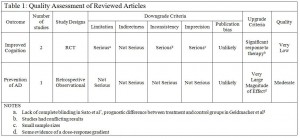Pioglitazone and Alzheimers Disease, a Possible Treatment and Preventative Modality
ABSTRACT
Background: Alzheimers disease is common and debilitating, and diabetes is a widely documented risk factor for the development of Alzheimers disease. Given that Alzheimers disease and diabetes are two extremely common and comorbid conditions in geriatric populations that greatly affect quality of life, it follows that treatment and prevention of both pathologies be exhaustively investigated. This is especially evident, as there is no existing medication that prevents or reverses the pathogenesis of Alzheimers disease. Pioglitazone, a peroxisome proliferator-activated receptor gamma agonists of the thiazolidinedione drug class, acts by up-regulating gene expression cell receptors that improve insulin sensitivity at target tissue. This drug also has the salutary effect of improving patient lipid profiles and acting as an anti-inflammatory agent. Research is evolving that suggests that pioglitazone may play a role in preventing the onset of Alzheimers disease in non-insulin dependent diabetic patients. Moreover, it has also been identified as possibly improving cognition in patients with existing mild Alzheimers disease. The purpose this systematic review is to revisit research that has been completed on pioglitazone regarding its efficacy treating mild cognitive impairment caused by Alzheimers disease as well as its possible role in preventing the onset of Alzheimers disease in diabetic patients.
Method: An exhaustive search using MEDLINE-Ovid, Web of Science, and Google Scholar was performed using keywords pioglitazone and dementia. Studies found were screened with eligibility criteria and analyzed for quality with GRADE. Clinical trials included two pilot, randomized control trials published in 2011 measuring piogtliazone’s use to treat mild cognitive impairment caused by Alzheimers disease. A retrospective observational study measuring pioglitazone’s preventative effect delaying or preventing the onset of Alzheimers disease was also included; this study has not yet been published, but has been accepted for publication and undergone full peer review.
Results: Three studies were included in this systematic review, meeting the eligibility criteria. One RCT looked at 42 patients with NIDDM and mild Alzheimers, showing statistically significant improvement in cognitive function with six months of treatment with pioglitazone. Another RCT looked at 28 patients without diabetes and with mild Alzheimers disease that found no significant improvement in cognition with 18 months of treatment with pioglitazone. Finally, a retrospective observational study demonstrated a 47% risk reduction in the development of Alzheimers disease when patients were treated with pioglitazone for greater than or equal to 8 quartiles (when compared to diabetics not receiving pioglitazone).
Conclusion: It is thought that pioglitazone may improve cognition and delay the onset of Alzheimers due to its multiple positive benefits including increasing insulin sensitivity, improving lipid profiles, and acting as an anti-inflammatory agent. While the quality of evidence that is currently available is not enough to suggest the use of pioglitazone to treat mild cognitive impairment caused by Alzheimers disease, there is compelling data to suggest its use as a preventative modality possibly delaying the onset of Alzheimers disease in diabetic patients. This is an evolving area of research, and larger, double-blinded randomized control trials are needed to elucidate pioglitazone’s efficacy. If found to be efficacious, pioglitazone, a drug that is widely available and relatively safe to take, could help to uncouple the pathogenesis of two major pervasive and life altering disease processes: diabetes and Alzheimers disease.
Keywords: Pioglitazone, dementia
(Click on image to enlarge.)
REVIEWED STUDIES:
Sato, T., Hanyu H., Hirao K., et al. Efficacy of PPAR-gamma agonist pioglitazone in mild Alzheimer disease. Neurobiology of Aging. 2011; 32, 1626-1633.
Geldmacher, D., Fritsch, T., McKee J., et al. A randomized pilot clinical trial of the safety of pioglitazone in treatment of patients with Alzheimer disease. Arch Neurology. 2011; 68(1), 45-50.
Heneka, M., Fink A., Doblhammer, G. Effect of pioglitazone medication on the incidence of dementia. Accepted Article. Germany, 2015.
AUTHOR: Jeffrey Otis is currently completing his second year in the School of PA Studies at Pacific University, Oregon. He will graduate with an MS in Physician Assistant Studies in August, 2016.


No Comments Yet